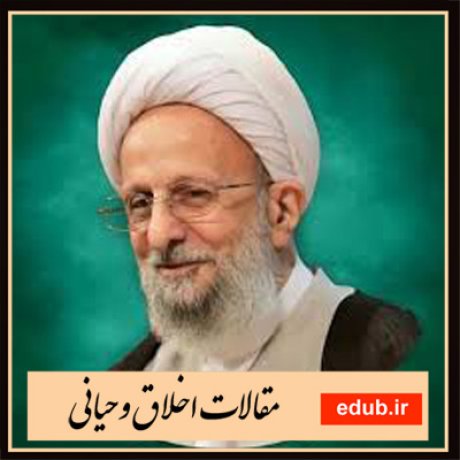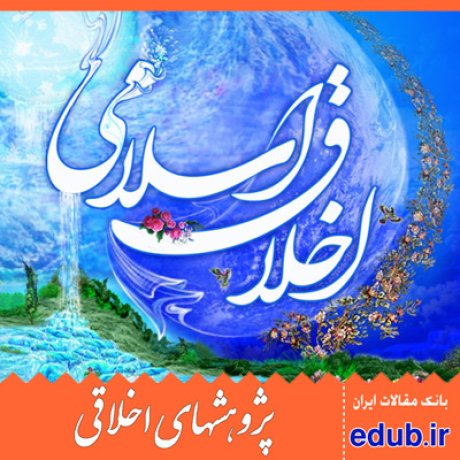مقاله بررسی نظریة فلسفة اخلاق آیتالله مصباح یزدی و نسبت آن با «توحید»

مقاله علمی و پژوهشی " بررسی نظریة فلسفة اخلاق آیتالله مصباح یزدی و نسبت آن با «توحید»" مقاله ای است در 35 صفحه و با 7 فهرست منبع که در مجلات معتبر علمی و پژوهشی با رویکرد اخلاق وحیانی منتشر شده است
در این مقاله علمی و پژوهشی به مباحث حبّ نفس؛ کمال نهایی؛ ضرورت بالقیاس الی الغیر؛ پرستش و توحید؛ طاعت و عصیانپرداخته شده است
چکیده مقاله
نظریۀ استاد مصباح را میبایست در دو مبحث «تحلیل فعل اخلاقی» و «تحلیل گزارههای اخلاقی» بیان کرد. در بخش اول، استاد مصباح معتقد است که میل محوری و اصلی در انسان، «حب نفس» است؛ و آن کمال و مطلوبیتی که بیشتر از همه، منافع نفس را تأمین میکند، دوست داشتنیتر و علاقۀ انسان به آن افزونتر است. چنین مطلوبی را «کمال نهایی» میخوانند که مصداق آن، «قرب به خداوند» است. بنابراین افعالی که نسبت به این کمال نهایی جنبۀ مقدمیت دارند و موجب تقرب میشوند، فعل اخلاقی و ارزشیاند؛ و افعالی که جنبۀ مانعیت دارند، افعال ضداخلاقی هستند. مقصود ایشان از «مقدمیت»، ضرورت بالقیاس میان فعل اخلاقی و آن کمال نهایی است. در مبحث دوم (تحلیل گزارههای اخلاقی)، ایشان «موضوع گزارههای اخلاقی» را از سنخ مفاهیم ثانی فلسفی میداند که از روابط علیتی موجود بین فعل اختیاری و نتیجۀ آن، انتزاع میشود. بخش دوم مقاله به بررسی این نظریه و نسبت آن با «توحید» اختصاص دارد. آیا طبق این نظریه، «پرستش و عبودیت» به تبع «حب نفس» تعریف نمیشود؟ آیا شدت و ضعف در «حب نفس» میتواند توجیهکنندۀ «طاعت و عصیان» الاهی شود؟ آیا این نظریه، برای طرح نظام افعال اخلاقی موفق است؟ سؤالات سهگانۀ فوق، محورهای بخش دوم مقاله است.
عنوان مقاله [English]
The Study of Ayatollah Mesbah Yazdi’s Philosophical Theory in Comparison with the Issue of “Unity”
چکیده [English]
The theory of ayatollah Mesbah must be presented through the two issues of “the analysis of ethical deeds” and “the analysis of ethical statements”. With regard to the first issue, ayatollah Mesbah believes that the main and axial drive in human beings is “self-love” and that the goal that provides one’s “self” with its interests, more than anything else, is more loved and favored by him and such a goal is named the “ultimate perfection” whose extension is “nearness to Allah”. Therefore, the prerequisites that can pave the way for this “nearness” are the worthy and ethical deeds, and those which hinder the achievement of this “nearness” are the immoral deeds. What ayatollah Mesbah means by “prerequisites” is the necessary relationship between the ethical deed and the ultimate perfection. With regard to the second issue (i.e. the analysis of the ethical statements) he considers the issue of “ethical statements” as one of the secondary philosophical concepts, which is inferred from the causal relationships between the “voluntary action” and its result. The second part of the present paper is devoted to the examination of this theory in comparison with the concept of “Unity”.Here, the questions “can one analyze the issues of worshipping and devotion as being the result of “self-love” based on this theory?” and “can varying levels of self-love justify “obeying and disobeying” Allah?” are raised. The study of these two questions is the pursuit of the second part of this paper.
کلیدواژهها [English]
self-love, Ultimate Perfection, the necessity of the comparison in-relation-to-something-else, worshipping and Unity, obedience and disobedience
دانشجویان دوره دکترا و کارشناسی ارشد می تواند از محتوای این مقاله برای رساله دکترا و پایان نامه کارشناسی ارشد بهره ببرند .
مطالب مرتبط
-
 نقش توحید در زندگی انسان
نقش توحید در زندگی انسان
-
 مقاله علم اخلاق: تعریف، موضوع و هدف
مقاله علم اخلاق: تعریف، موضوع و هدف
-
 مقاله مقایسه تطبیقی نظریه محقق طوسی و علامۀ حلّی در معاد جسمانی با نظریه شبیهسازی
مقاله مقایسه تطبیقی نظریه محقق طوسی و علامۀ حلّی در معاد جسمانی با نظریه شبیهسازی
-
 مقاله کاربرد اصل تشکیک در معاد جسمانی از دیدگاه ملاصدرا
مقاله کاربرد اصل تشکیک در معاد جسمانی از دیدگاه ملاصدرا
-
 مقاله اصول تربیت اخلاقی از منظر اسلام: رویکردی تطبیقی
مقاله اصول تربیت اخلاقی از منظر اسلام: رویکردی تطبیقی
-
 مقاله بررسی رابطه بین اخلاق اسلامی کار و فرهنگ سازمانی با رضایت شغلی کارکنان
مقاله بررسی رابطه بین اخلاق اسلامی کار و فرهنگ سازمانی با رضایت شغلی کارکنان
-
 مقاله رابطه دین و اخلاق در قرآن
مقاله رابطه دین و اخلاق در قرآن
-
 مقاله بررسی نقش و تأثیر اخلاق اسلامی کار بر فرهنگ سازمانی و سلامت اداری
مقاله بررسی نقش و تأثیر اخلاق اسلامی کار بر فرهنگ سازمانی و سلامت اداری
تگها
مطالب پربیننده
- چگونه تشخیص دهیم یک تصویر با هوش مصنوعی ساخته شده؟
- آموزش کامل تهیه سبزه عید با تخم شربتی
- کاهش وزن علمی و بدون برگشت
- چگونه میتوان از اینستاگرام، تیکتاک و گوشیهای همراه فاصله گرفت؟
- کمبود چه مواد غذایی باعث افزایش ابتلا به افسردگی میشود؟
- چطور مامان بابای خودمان باشیم؟
- مادران تلفنهمراه خود را به کودکشان بدهند یا خیر؟
- چرا مردان در بیان احساسات خود موفق نیستند؟
- آیا در برزخ، شفاعت وجود دارد؟
- "همای سعادت" اسطوره یا واقعیت؟!
- گیاهانی که استرس خانه و محل کار را کاهش میدهند
- سیگارهای الکترونیک یک جایگزین توهم زا
- سونامی سالمندی، بحران پیش روی کشور
- درباره خانه عباسیان، شاهکار معماری ایران در کاشان
- درباره قنات بلده فردوس؛ بیبدیل در دل کویر
- درباره شغاب، گورستان دلاوران در بوشهر
- کاخ خسرو کرمانشاه؛ شکوهی به جا مانده از دوران ساسانی
- درباره پل ساسانی دزفول، کهنترین پل آجری جهان
- چگونه سینمای ایران به رکورد فروش ۱۰۰۰ میلیارد تومان رسید؟
- لذتبخشترین نماز
- درباره تذهیب و انواع آن
- چقدر برای شریک زندگیمان وقت بگذاریم؟
- مواد غذایی موثر در بهبود علائم یائسگی
- حضرت زهرا (س) و تاکید روی آموزش علم
- هشدار؛ چه پیامکهایی را باز نکنید
- اسانسهای دافع اضطراب را بشناسیم
- حضرت زهرا (س)، الگوی بیبدیل یک زن مسلمان
- درمان تورم کف و قوزک پا
- معرفی غذاهای سنتی ایرانی در شب یلدا همراه با تصاویر
- نحوه آموزش صبر و بردباری به کودکان
- قوانین کلاس و مدرسه
- قالب آماده و زیبای پاورپوینت(15)
- ۵ فیلم که همه زنان ایرانی باید تماشا کنند
- شعار سال ۱۴۰۱ «سال تولید، دانشبنیان و اشتغالآفرین»
- قالب زیبای پاورپوینت برای ارائه پروپوزال و دفاع رساله دکترا
- قالب پاورپوینت کادر دار زیبا
- قالب پاورپوینت گرافیکی و طرح دار زیبا
- قالب پاورپوینت گرافیکی زیبا
- رنگ چشم هایتان درباره شما و اجدادتان چه می گوید؟
- قالب پاورپوینت گرافیکی جالب
- نمونه تدریس درس اول هدیه آسمان پنجم
- پورنوگرافی چیست و چه اثری بر مغز و رابطه جنسی دارد؟
- اندکی درباره درسپژوهی
- کتاب پسری که جادویی شد
- همه زائران سلطان
- قالب پاورپوینت
- معرفی کتاب
- دوستی با کتاب
- قالب پاورپوینت گرافیکی
- درباره محسن رضایی
- معرفی کتاب
- کتاب راهنمای کامل Interaction access
- درباره امیر کبیر
- کتاب پیوند زخم خورده
- کتاب آموزش علیه آموزش
- درباره فخرالدین عراقی
- خلاصه کتاب سواد بصری
- درباره محسن مهر علیزاده
- تورم به کدام سو میرود؟
- طغیان سرخک

